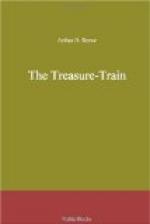MacLeod looked at us inquiringly, and Kennedy nodded to go on, though I am sure neither of us was familiar with the place.
“They’ve called the new plant Nitropolis—rather a neat name for a powder-works, don’t you think?” resumed MacLeod. “Everything went along all right until a few days ago. Then one of the buildings, a storehouse, was blown up. We couldn’t be sure that it was an accident, so we redoubled our precautions. It was of no use. That started it. The very next day another building was blown up, then another, until now there have been five of them. What may happen to-day Heaven only knows! I want to get back as soon as I can.”
“Rather too frequent, I must admit, to be coincidences,” remarked Kennedy.
“No; they can’t all be accidents,” asserted MacLeod, confidently. “There’s too great regularity for that. I think I’ve considered almost everything. I don’t see how they can be from bombs placed by workmen. At least, it’s not a bit likely. Besides, the explosions all occur in broad daylight, not at night. We’re very careful about the men we employ, and they’re watched all the time. The company has a guard of its own, twenty-five picked men, under me—all honorably discharged United States army men.”
“You have formed no theory of your own?” queried Kennedy.
MacLeod paused, then drew from his pocket the clipping of a despatch from the front in which one of the war correspondents reported the destruction of wire entanglements with heat supposed to have been applied by the use of reflecting mirrors.
“I’m reduced to pure speculation,” he remarked. “To-day they seem to be reviving all the ancient practices. Maybe some one is going at it like Archimedes.”
“Not impossible,” returned Craig, handing back the clipping. “Buffon tested the probability of the achievement of Archimedes in setting fire to the ships of Marcellus with mirrors and the sun’s rays. He constructed a composite mirror of a hundred and twenty-eight plane mirrors, and with it he was able to ignite wood at two hundred and ten feet. However, I shrewdly suspect that, even if this story is true, they are using hydrogen or acetylene flares over there. But none of these things would be feasible in your case. You’d know it.”
“Could it be some one who is projecting a deadly wireless force which causes the explosions?” I put in, mindful of a previous case of Kennedy’s. “We all know that inventors have been working for years on the idea of making explosives obsolete and guns junk. If some one has hit on a way of guiding an electric wave through the air and concentrating power at a point, munitions-plants could be wiped out.”
MacLeod looked anxiously from me to Kennedy, but Craig betrayed nothing by his face except his interest.
“Sometimes I have imagined I heard a peculiar, faint, whirring noise in the air,” he remarked, thoughtfully. “I thought of having the men on the watch for air-ships, but they’ve never seen a trace of one. It might be some power either like this,” he added, shaking the clipping, “or like that which Mr. Jameson suggests.”




